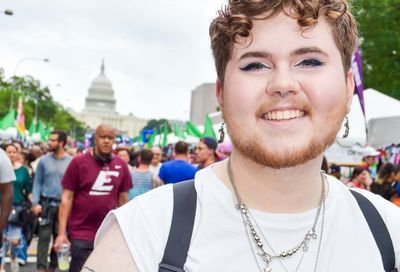Boston Marathon will allow transgender runners to race according to gender identity
Some critics allege that transgender women, in particular, have an unfair advantage if they're not on hormone therapy

Boston Marathon officials say they’ll allow transgender women to race as women in the annual 26.2-mile race, one of the nation’s premier running events.
According to The Boston Herald, at least five openly transgender women have signed up for the race on Monday, April 16. While they are not the first transgender women to do so, they have sparked a controversy among some experts as to whether their biological makeup gives them an unfair competitive advantage.
Many presume that a man who was assigned female at birth will not have a natural competitive edge over cisgender men. However, many worry that transgender women will take honors that would otherwise go to cisgender women.
The issue of transgender racers first attracted attention after a blogger wrote about three transgender women who had qualified for the race. But Tom Grilk, the chief of the Boston Athletic Association, which plans and hosts the marathon each year, says there wasn’t much internal debate about allowing runners to compete according to the gender with which they identify.
“We take people at their word. We register people as they specify themselves to be,” Grilk said. “Members of the LGBT community have had a lot to deal with over the years, and we’d rather not add to that burden.”
The New York, Chicago, Los Angeles and London Marathons have instituted similar policies, allowing runners to compete according to their gender identity, so long as it is the gender they identified with in qualifying for the marathon. In Boston, registrants will be required to show government-issued ID in order to obtain a bib number, and that is compared to the gender that the runner has identified with when registering for the race.
Race officials have not offered specifics on how they would handle a discrepancy between an ID and a person’s identified gender, but the Boston Athletic Association told NPR: “Should such a situation arise, we would make every effort to address it in a manner intended to be fair to all concerned, with a strong emphasis on inclusion.”
The acceptance of transgender athletes has become a controversial issue in recent years, particularly the inclusion of transgender women, who generally have higher testosterone levels unless they undergo gender confirmation surgery or take hormones to lower those levels. The International Olympic Committee ruled in 2016 that transgender males may compete “without restriction” and requires transgender females to demonstrate that their testosterone level has been below a certain cutoff point for at least one year prior to competition.
The NCAA also allows transgender athletes to compete according to the gender with which they identify, as do many high schools. But that has not stopped controversy from creeping in, both in states with pro-transgender policies — as in Connecticut, when track star Andraya Yearwood was criticized after she won two Class M state titles — and those without them — as in Texas, where transgender wrestler Mack Beggs was booed for winning a state title, despite it being the fault of the state legislature and the University Interscholastic League that Beggs was forced to wrestle against girls.
Stevie Romer, a transgender woman from Woodstock, Ill., who qualified as a woman for the Boston Marathon, said she registered according to her gender identity, and has legally changed her gender, even though she hasn’t gone on hormones to lower her testosterone levels.
“To be able to experience it as me was really, really important,” she told CBS News about registering as a woman. “I’ve been a runner since as long as I can remember. I love running, but I just happen to be transgender.”
Bob Girandola, an associate professor in the Department of Human Biology at the University of Southern California, says transgender women may have an “unfair advantage” due to higher testosterone levels.
“If they still have male gonads, they will have an advantage over other women — there is no way around that,” he says.
But Dr. Alex Keuroghlian, the director of education and training programs at the Fenway Institute in Boston, dismisses those claims as “a misconception and a myth.” Rather, transgender women on medication to lower their testosterone levels often experience side effects like dehydration, sluggishness, and reduced stamina.
“There’s no physiologic advantage to being assigned male at birth,” says Keuroughlian.
In any case, the debate over inclusion is likely to persist as more transgender people who are competing in athletics gain more prominence or recognition.
“It’s kind of murky how people handle it,” Amelia Gapin, another transgender entrant, told the Herald. “We are such a small percentage of the population that we generally just fly under the radar.”
Support Metro Weekly’s Journalism
These are challenging times for news organizations. And yet it’s crucial we stay active and provide vital resources and information to both our local readers and the world. So won’t you please take a moment and consider supporting Metro Weekly with a membership? For as little as $5 a month, you can help ensure Metro Weekly magazine and MetroWeekly.com remain free, viable resources as we provide the best, most diverse, culturally-resonant LGBTQ coverage in both the D.C. region and around the world. Memberships come with exclusive perks and discounts, your own personal digital delivery of each week’s magazine (and an archive), access to our Member's Lounge when it launches this fall, and exclusive members-only items like Metro Weekly Membership Mugs and Tote Bags! Check out all our membership levels here and please join us today!




























You must be logged in to post a comment.